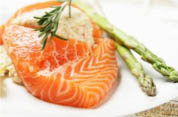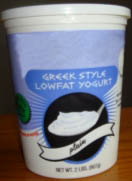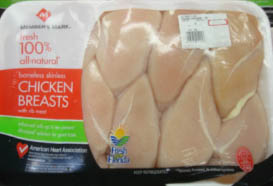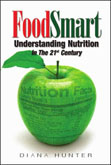 FoodSmart Focus:
Edition 1 / September 2010
FoodSmart Focus:
Edition 1 / September 2010
Nutrition News for the 21st Century
Looking for
interesting, pertinent, and timely
information about foods, beverages,
supplements, and other consumables?
Want to read about current nutrition
issues based on sound science, not hype
and speculation? In FoodSmart Focus you'll
find that and more. This new bimonthly
newsletter by nationally noted nutrition
researcher and award-winning FoodSmart
author Diana Hunter covers a wide array of
nutrition topics and provides you with
nutrient information, recalls, health
tips, healthy recipes, food reviews, a Q &
A section, member news and views, and a
whole lot more.
Sign Up For
FoodSmart Focus Today!
Only $20 per year.
From The Editor
 Greetings!
Greetings!
Welcome
to the first edition of FoodSmart Focus, a
new nutrition newsletter dedicated to
bringing you interesting, pertinent, and
timely topics on foods, beverages,
supplements, and other consumables. The
newsletter will feature current nutrition
issues along with nutrient information,
recalls, a tip of the month, healthy
recipes, food reviews, a Q & A section,
member news and views, and a lot more. In
it you'll find valid, factual information
based on sound science, not hype and
speculation. Have an idea, question,
comment, or suggestion? Feel free to email
us at
comments@foodsmart.org,
visit our contact form, or call us at
954.370.9153 from 8:00 a.m. to 7:00 p.m. E.S.T.
Enjoy and Be FoodSmart!
Diana Hunter,
Editor

Have
an idea, comment, question, or suggestion?
Email it to us at
comments@foodsmart.org.
©
Copyright 2010 Consumer Press, Inc. All
rights reserved. ISSN Pending
Copyright Notice
Privacy
Policy
Terms of Service
Disclaimer
Request Permission to reuse content
What's New In Nutrition
Chemical Reaction
 Adding
chemicals to foods and beverages is not a
new idea. But most people are shocked when
they find out how many are being used.
There are currently over 3000 food
additives in use on the market, the
majority of which are chemically based.
In light of this information, many
consumers are now taking a closer look at
what types of chemicals are in the foods
and beverages they consume and the
potential effects they may have on our
bodies. The problem is many of these
chemicals have not been sufficiently
tested, and most, if not all, have not
been tested for potential problems when
combined with other additives. New bills
proposed to Congress may help to rectify
the situation. In the meantime, what's a
consumer to do? The best bet is to avoid
chemicals whenever possible, not only with
regard to what we consume, but also when
choosing body care and household use
products (and even those for your
vehicle). For those products you simply
can't avoid, learn as much as you can
about the chemicals they contain. A good
place to start is the Center for Science
in the Public Interest, whose website
lists information about a number of food
chemicals and can be accessed free at the
following link:
http://www.cspinet.org/reports/chemcuisine.htm
- safety_summary.
Updates regarding new research on specific
chemicals will be featured in upcoming
issues of FoodSmart Focus.
Adding
chemicals to foods and beverages is not a
new idea. But most people are shocked when
they find out how many are being used.
There are currently over 3000 food
additives in use on the market, the
majority of which are chemically based.
In light of this information, many
consumers are now taking a closer look at
what types of chemicals are in the foods
and beverages they consume and the
potential effects they may have on our
bodies. The problem is many of these
chemicals have not been sufficiently
tested, and most, if not all, have not
been tested for potential problems when
combined with other additives. New bills
proposed to Congress may help to rectify
the situation. In the meantime, what's a
consumer to do? The best bet is to avoid
chemicals whenever possible, not only with
regard to what we consume, but also when
choosing body care and household use
products (and even those for your
vehicle). For those products you simply
can't avoid, learn as much as you can
about the chemicals they contain. A good
place to start is the Center for Science
in the Public Interest, whose website
lists information about a number of food
chemicals and can be accessed free at the
following link:
http://www.cspinet.org/reports/chemcuisine.htm
- safety_summary.
Updates regarding new research on specific
chemicals will be featured in upcoming
issues of FoodSmart Focus.
Food
Issues Now
Genetically Engineered Salmon

Size comparison of an AquAdvantage® Salmon (background) vs. a
non-transgenic Atlantic salmon sibling (foreground) of
the same age.
Transgenic salmon may soon be coming to a
supermarket — and restaurant—near you.
AquaBounty Technologies, a
Massachusetts-based biotechnology company,
has come up with a genetic recipe that
combines aspects of Pacific Chinook salmon
and ocean pout with Atlantic salmon to
create a fast-growing Atlantic salmon. The
new variety, named AquAdvantage® salmon,
would be marketable size in approximately
half the time of its wild counterparts —
about 16 to 18 months versus the usual 36.
It would be the first FDA-approved
transgenic animal for consumption.
While proponents say the salmon
will help fill an increasing void in
seafood availability and lessen the
effects of salmon overfishing, opponents
voice a number of concerns ranging from
health and labeling issues to potential
environmental effects. According to
AquaBounty, the salmon will not be
released into the wild, will be sterile
(and therefore unable to reproduce), and
are "just
the same as any other Atlantic salmon."
Some opponents, however, are worried that transplanting one fish's
growth hormone gene into another, as is
done in this case, may have yet-unknown
effects. Others question the certainty
that these fish will not be released into
the wild, and if they are, what the actual
outcome might be. Also questioned is
whether or not the feed provided to these
fish will lend toward them being truly
identical to any other Atlantic Salmon,
for better or worse, especially if newly
developed feeds that contain less fishmeal
and fish oil are used. As it stands, these
fish may or may not be required to be
labeled as having been genetically
engineered.
For more
information visit AquaBounty's press room:
http://www.aquabounty.com/PressRoom/.
To contact the FDA regarding this issue go
to
http://www.fda.gov/AboutFDA/ContactFDA/default.htm.

FoodSmart Tip
of the Month
Protective Probiotics
To cut
back on saturated fat and calories, gain
gut-healthy probiotics, and create lighter
meals, use plain low-fat or fat-free
yogurt in place of full-fat sour cream to
top baked potatoes, tacos, and other
foods, and as a base for homemade salad
dressing. Greek style lowfat and fat-free
yogurts generally have a rich, creamy
texture.


Nutrient Close-Up
Vitamin D
 Vitamin
D has always played an important role in
the development and maintenance of our
teeth and bones, not to mention our
neuromuscular (nerve/muscle) and immune
systems. More recent research has shown it
may also play an integral part in cancer
prevention and blood pressure regulation.
Although it is commonly known as a
vitamin, scientists often refer to it as
"vitamin D hormone" due to its chemical
structure and how it works in the body.
Ongoing research is likely to uncover
additional benefits related to its
hormone-like effects.
Vitamin
D has always played an important role in
the development and maintenance of our
teeth and bones, not to mention our
neuromuscular (nerve/muscle) and immune
systems. More recent research has shown it
may also play an integral part in cancer
prevention and blood pressure regulation.
Although it is commonly known as a
vitamin, scientists often refer to it as
"vitamin D hormone" due to its chemical
structure and how it works in the body.
Ongoing research is likely to uncover
additional benefits related to its
hormone-like effects.
Although vitamin D is fat-soluble, meaning
it is stored in the body (unlike B
vitamins and vitamin C, which are
water-soluble), many people in the U.S.
are deficient in this essential nutrient.
So many, in fact, that doctors now
frequently recommend checking vitamin D
levels as part of routine blood tests.
There are two main forms of vitamin D associated with food and human
health: vitamin D2 (also
called ergocalciferol) and vitamin D3
(also called cholecalciferol). Vitamin D2
is developed by exposing yeasts and fungi
(molds) to ultraviolet radiation, a
situation that rarely occurs in nature. As
a result it is usually produced
synthetically. Vitamin D3, on
the other hand, is produced naturally by
the body when our skin is exposed to
specific forms of UV light, particularly
sunlight (giving vitamin D the nickname
"the Sunshine Vitamin"). However, our age
and skin type, the use of sunscreen, and
other factors can interfere with the
development of this form of vitamin D.
Vitamin D3 is also found in
fatty fish such as salmon, and can be
obtained from purified versions of fat
found in lamb's wool. Overall, salmon,
tuna, sardines, cod liver oil, and
fortified foods and beverages, including
milk, are good sources of vitamin D. Eggs,
cheese, and beef liver also contain this
nutrient, though in lesser amounts.
The Adequate Intake (AI) level of vitamin
D established by the U.S. Institute of
Medicine of the National Academy of
Sciences is 5
µg
(micrograms) or 200 IU (International
Units) daily
for
everyone under the age of 50.
For those 50 to 70 years of age the
recommendation is 10
µg or
400 IU daily, and for those over 70 it is
15
µg
or 600 IU daily. A number of experts
believe these amounts should be higher,
especially for those who avoid or don't
have access to regular sun exposure.
The established UL (Upper Limit) for adults 19 years of age and older
is 50 µg or 2,000 IU daily from
supplements in order to avoid toxicity.
FoodSmart Challenge
Which of
the following foods provides beneficial
omega-3 fatty acids?
(see answer below question)
(a) beef
(b)
cocoa
(c) kiwi
(d) walnuts
FoodSmart Challenge Answer: (d) walnuts
On
The Menu
Fabulous FoodSmart
Popcorn
This
low-cost, tasty treat provides fiber,
omega 3,6, and 9 fatty acids, and trace
minerals along with other nutrients.
Beware: once you try it, you'll be hooked.
6-8 cups
air-popped
popcorn
2 Tbsp.
Olive
oil
1/4 tsp.
Sea salt with trace minerals
To Prepare:
Pop
approximately 1/2 cup popcorn seeds in
hot-air popper. Drizzle olive oil
uniformly over popped corn. Sprinkle with
trace mineral sea salt. Enjoy!

Sidenotes: Standard hot
air poppers range in price from
approximately $15-$30. They're well
worth the investment, as they end up
paying for themselves when compared with
the high cost of packaged snacks.

Did You Know?
Red wine
is not the only source of resveratrol. Grapes
(skins only), grape juice, peanuts, and
various berries, including blueberries and
cranberries, also contain this chemical
compound, which is currently being studied
for a number of potential
health benefits. More research needs to be
done in this area. Also, any long-term
effects from the use of supplemental
resveratrol are unknown.
Ma
& Pa's Corner
A Matter of
Taste
When
we're born we have about 10,000 taste buds
covering the entire surface of our
tongues. As we age, however, our taste
buds "migrate" toward the outer edges of
our tongues. Don't believe it? Try rubbing
something flavorful on the middle of your
tongue and you'll be convinced. We also
have less taste buds over time. Ohio
State University reports
that at age 30 we have approximately 245
taste buds on each of the tiny elevations
(called papilla) on our tongues, but by
age 70 that number is reduced to
approximately 88. To keep our ability to
taste at its best we can:

• practice good oral hygiene
• maintain good dental health
• correct ill-fitting dentures
• avoid foodborne and airborne allergens
• maintain good overall health
This Month's Nutrition Definition
Hydrogenation:
the
process of heating liquid (unsaturated)
vegetable oils and adding a specific
amount of hydrogen to them, causing the
creation of unhealthy trans fats. Seen on
food labels as "hydrogenated oil" or
"partially hydrogenated oil." Hydrogenated
oil in peanut butter adds a negligible
amount of trans fat.
FoodSmart Food
Patrol
 Those
looking to reduce the amount of sodium in
your diet take note: Member's Mark® fresh,
100% all-natural, boneless, skinless
chicken breasts with rib meat from Sam's
Club contain added salt. A four-ounce (112
grams) portion contains 250 milligrams of
sodium, or 10% of our daily value based on
a 2000-calorie diet. According to the USDA
National Nutrient Database for Standard
Reference, a 100 gram portion of raw,
light meat, meat-only roasting chicken
without any added ingredients contains
approximately 51 grams of sodium. That
means the Member's Mark chicken breasts
contain more than quadruple
the sodium of fresh, raw, untreated
chicken — an important consideration for
those who have high blood pressure
(hypertensive) or are pre-hypertensive.
Those
looking to reduce the amount of sodium in
your diet take note: Member's Mark® fresh,
100% all-natural, boneless, skinless
chicken breasts with rib meat from Sam's
Club contain added salt. A four-ounce (112
grams) portion contains 250 milligrams of
sodium, or 10% of our daily value based on
a 2000-calorie diet. According to the USDA
National Nutrient Database for Standard
Reference, a 100 gram portion of raw,
light meat, meat-only roasting chicken
without any added ingredients contains
approximately 51 grams of sodium. That
means the Member's Mark chicken breasts
contain more than quadruple
the sodium of fresh, raw, untreated
chicken — an important consideration for
those who have high blood pressure
(hypertensive) or are pre-hypertensive.
Food Of The Month
Strawberries
If
you're looking for a sweet, juicy,
nutrient-packed snack, strawberries may be
just the ticket. Not only are they an
excellent source of vitamin C, but they
also contain a number of other vitamins
and minerals including potassium, calcium,
magnesium, and folate. They even provide
fiber —about 2 grams for every 100 grams
of berries—and phytonutrients (chemical
compounds found in plants that are likely
to be beneficial for human health)
including flavonoids, anthocyanidins, and
ellagic acid. And they're versatile in a
wide range of recipes from homemade
strawberry lemonade to lowfat, lower-sugar
strawberry shortcake. FoodSmart Tip:
strawberries are often sprayed with
pesticides and other chemicals, so
consider opting for organic when possible
and always wash all fruit well before
consuming. Enjoy!

FoodSmart
Q & A
Have A Nutrition-Related
Question?
Just Click on Pooker's Pic
to Submit It!
Your Question May Be Answered
In An Upcoming Edition of
FoodSmart Focus

Pooker
Q:
Some labels have ingredients on
them that I don't understand. MSG is one
of them, and I am allergic to it. How do I
detect MSG on a label? Richard
A:
Dear Richard:
MSG is a
commercially produced additive used as a
flavor enhancer. When it is added to
foods, the FDA requires that it be listed
on labels (and menus) as its full given
name, "monosodium glutamate." However, if
you suffer from reactions to MSG or have
an intolerance to it (a condition often
referred to as "MSG Symptom Complex" or
"Chinese Restaurant Syndrome"), there is
more you need to know about glutamate in
general.
Glutamate (also called glutamic acid) is
an amino acid found naturally in plant and
animal protein. The majority of glutamate
found in most plant and animal foods is
"bound" glutamate that is "attached" to
each respective type of protein. This form
of glutamate is unlikely to cause health
problems. Conversely, glutamate found in
many additives, and therefore many
processed foods, is "free" glutamate that
has been broken from its bound form during
ingredient processing. Free glutamate can
combine with free sodium to create
monosodium (mono = one; sodium = salt)
glutamate. Examples of additives that
contain free glutamate include hydrolyzed
vegetable protein, autolyzed yeast, and
yeast extract. Commercially produced
monosodium glutamate differs from free
glutamate in that it is intentionally
derived from the glutamate amino acid and
combined with sodium rather than forming
as a result of food processing or
occurring naturally in foods. Many people
report having reactions after ingesting
processed foods that contain the "free"
form of glutamate identical to those they
experience after eating commercially
produced MSG. A number of people also
report having reactions when they ingest
foods that contain higher levels of
naturally occurring free glutamate, such
as tomatoes, Parmesan cheese, and
mushrooms, or when they ingest a large
amount of free glutamate from a
combination of sources, especially on an
empty stomach.
In addition to these considerations, it is
important to know that ingredients or
additives listed on labels may themselves
contain MSG (or free glutamate due to
processing, or both), in which case MSG
may in fact be in a product but not be
listed on the label. MSG may also contain
contaminants that have the potential to
cause reactions.
Lastly, while we need glutamate for nerve
transmission and other important bodily
functions, it is a non-essential amino
acid, meaning our bodies can manufacture
it on their own without ever deriving it
from our diet.
Hope this helps.
Kids' Connection
Tips To Beat Overweight & Obesity
Kids can
maintain a healthy weight by eating
healthy foods in moderate amounts and
getting sufficient sleep and exercise.
This month's healthy food alternative for
kids: swap out regular pasta for whole
grain pasta or pasta made partially with
whole grain. You'll get more fiber, eat
less, and feel full longer—and it's
delicious.


Teen Track
The Importance of Calcium
According to the National Institutes of
Health (NIH), fewer than one in ten girls
and only one in four boys ages 9 to 13 are
at or above their adequate intake of
calcium. The NIH also reports that by
approximately age 17 ninety percent of the
adult bone mass for both males and females
is established — an important
consideration in preventing osteoporosis
later in life.
Foods high in calcium include milk,
yogurt, cheese, almonds, almond milk,
spinach, broccoli, kale, salmon (canned
with bones), sardines, and
calcium-fortified foods and beverages.
What's Your Take?
Should the government be allowed to keep
digital online records of each citizen's
Body Mass Index (BMI) – a number
calculated using height and weight that
indicates if a person is overweight or
obese?
visit our contact form to voice your
opinion
Recalls / August 2010
August
4, 2010
Product Recall – Eugenio Brezzi Truffle
Puree
August 06, 2010
Staphylococcus Aureus in Queso Cotija
Cheese
South Bend Chocolate Company Announces
Nationwide Recall of Bountiful Blend
Chocolates Due to Undeclared Tree Nuts
August 09, 2010
Strong America Ltd. Issues an Alert on
Undeclared Sulfites in Golden Smell Brand
"Dried Potato"
Prolatis’ Issues a Voluntary Nationwide
Recall of its product Prolatis’ Marketed
as Dietary Supplement prior to August 9,
2010
August 10, 2010
Fresh Express Announces Precautionary
Recall of a Limited Number of Cases of
Veggie Lovers Salad with an Expiration
Date of August 10 Due to a Possible Health
Risk
August 13, 2010
Merrick Pet Care Recalls Filet Squares &
Texas Hold’ems 10oz Bag (Item # 60016 All
Lots) Because of Possible Salmonella
Health Risk
Wright County Egg Conducts Nationwide
Voluntary Recalls of Shell Eggs Because of
Possible Health Risk
Goya Foods, Inc. Announces Voluntary
Recall of Frozen Mamey Pulp, Produced By
Coco, S.A. of Guatemala Because of
Potential Health Risk
August 14, 2010
Nationwide Milk Allergen Recall of Kroger
"Meals Made Simple Shrimp Linguini"
August 16, 2010
Elie Baking Corp issues Allergy Alert on
Undeclared Soy in Food City brand Low-Carb
Tortilla White and Whole Wheat 10 count
August 17, 2010
NuCal Foods Conducts Recall of Shell Eggs
Supplied from Wright County Egg Because of
Possible Health Risk
Undeclared Sulfites in "Golden Bridge"
Dried Dates
NY Fish Inc Issues an alert on
uneviscerated fish
NBTY Acquisition LLC Dba Leiner Health
Products Issues Allergy Alert on
Undeclared Soy in Air Shield Effervescent
Tablets, Air Protector Effervescent
Tablets, Immune System Support
Effervescent, and Airhealth Effervescent
Tablets And Stick Packs
August 18, 2010
Fruiti Pops, Inc. Recalls "Fruiti Pops"
Brand Mamey Frozen Fruit Bars Because of
Potential Health Risk
Glow Industries, Inc. Issues Nationwide
Recall of Mr. Magic Male Enhancer from Don
Wands Amended
J & H Besta Expands Nationwide Recall of
Slim- 30 Herb Supplement to Include Lot
6032101 Found to Contain an Undeclared
Drug Ingredient
Montalvan’s Sales, Inc. Recalls “La
Nuestra” Brand Frozen Mamey Because of
Potential Health Risk
Wright County Egg Expands Nationwide
Voluntary Recall of Shell Eggs Because of
Possible Health Risk
Moonstruck Chocolate Co. Issues Nationwide
Allergy Alert on Undeclared Peanut-Butter
Filling in Their 4 Piece Cream Cone
Chocolate Truffle Collection and 12 Piece
Chocolate Malted (or Malt)
August 19, 2010
COUNTRY Eggs, Inc. Initiates Voluntary
Recall of Large AA Loose 15 dozen Fresh
Shell Eggs Because of Possible Health Risk
Salmonella in Alfalfa Sprouts
Austinuts Wholesale, Inc. Announces
Voluntary Recall of Pistachio Kernel
Products
August 20, 2010
NuCal Foods Conducts Recall of Shell Eggs
Supplied from Hillandale Farms of Iowa
Because of Possible Health Risk
Milton's Baking Voluntarily Recalls 24 oz.
Multi-Grain Bread in Three States For
Undeclared Milk in Some Loaves
Hillandale Farms of Iowa Conducts
Nationwide Voluntary Recall of Shell Eggs
Because of Possible Health Risk
Lubersk i Inc., Initiates Voluntary Recall
of Large Fresh Shell Eggs Because of
Possible Health Risk
GloryBee Foods Recalls Whole Raw Pistachio
and Whole Raw Pistachio Kernels Because of
Possible Health Risk
August 23, 2010
Moark, LLC, of Fontana, California,
Recalls Shell Eggs Supplied From
Hillandale Farms of Iowa Because of
Possible Health Risk
August 24, 2010
Natural Wellness, Inc. Issues a Nationwide
Voluntary Recall of Masxtreme Capsules,
Marketed as a Dietary Supplement -
08/24/10
Azteca Linda Corp. Recalls Queso Fresco
and Queso Hebra because of Possible Health
Risk
August 25, 2010
Cardenas Market Brand Label Included in
Wright County Egg Recall
Trafficanda Egg Ranch Initiates Voluntary
Recall of Medium, Large, X Large, & Jumbo
AA Cartons; 5 Dozen Medium Over Wrap & 20
Count Over Wrap, Fresh Shell Eggs Because
of Possible Health Risk
August 26, 2010
Cal-Maine Foods, Inc. Clarifies Previous
Statement on Nationwide Shell Egg Recall
August 27, 2010
Queseria Chipilo Recalls Cheese Products
Because of Possible Health Risk
Sparboe Farms Initiated Voluntary Recall
Fresh Shell Eggs
August 29, 2010
P&G Recalls Small Number of Bags of Cat
Food From Stores in Loveland, Colorado
Member News & Views
Have A Healthy Recipe,
Garden Picture, Food Story, Or Other
Interesting Nutrition-Related Info You'd
Like To Share?
Click Here for Submission Guidelines

Products & Services

$21.95 / FREE SHIPPING
Click Here To Order
Copyright Notice
All information and material contained on
this site is protected by United States
copyright law and may not be reproduced,
distributed, transmitted, displayed,
published, broadcast, licensed,
transferred, sold, or otherwise utilized
in any manner whatsoever, in whole or in
part, without the prior written permission
of Diana Hunter and Consumer Press Inc.
All third-party content retains its
respective owner copyright(s). The
removal of any trademark, servicemark,
copyright, or other legal identifier is
strictly prohibited.
Newsletter members and other duly
authorized individuals may download one
(1) machine-readable copy and one (1)
print copy of the newsletter solely for
personal, noncommercial use or other use
as deemed permissible in writing by Diana
Hunter, Consumer Press Inc., and all
third-party copyright owners, as
applicable.
Links to external sites other than those
owned and managed by Consumer Press Inc.
are offered as an assistance to readers.
Diana Hunter, Consumer Press Inc. and all
related heirs, successors, and assigns
claim no responsibility for content
provided by such sites or damages
resulting from access to such sites.
For further
information, see our
Terms of Service.
Privacy
Consumer Press does not collect
information on consumers who visit or
browse this site. IP and email addresses
are not recognized by our server. Postal
addresses, telephone numbers, and other
forms of information received online at
this site are not disclosed to, or shared
with, any other organization except in
cases specifically required by law.
For further information:
Consumer Press
13326 Southwest 28th Street, Suite 102
Fort Lauderdale, FL 33330-1102
T: 954.370.9153
legal@consumerpress.com
Security
This is a secure site.
Email
We reserve the right to retain the content
of your email messages, your email
address, and our responses for legal and
communication purposes.
Links to Other Websites
FoodSmart Focus contains links to other
websites as a service to our readers.
FoodSmart.org, Consumer Press Inc., Diana
Hunter, and all related affiliates,
successors, and assigns assume no
liability for damages resulting from
access to such sites. We strongly
recommend that you review the practices
and privacy policies for all sites. A link
in FoodSmart Focus does not imply an
endorsement. To report problems or issues
regarding a link please email
links@foodsmart.org.
Terms of Service
By using this site you agree to follow and
be bound by the terms, conditions, and
notices contained herein and on other
pages of this site concerning your use of
the site. We reserve the right to make
changes to the site and/or may revise the
Terms of Use at any time without prior
notice.
General
These terms of service are governed in
accordance with the laws of the State of
Florida, and the parties irrevocably
consent to bring any action to enforce
this agreement in the courts located in
Fort Lauderdale, Florida in all disputes
arising out of or relating to FoodSmart
Focus. If any provision of this Agreement
is held to be invalid or unenforceable,
then the invalid or unenforceable
provision or provisions will be deemed
superseded by one or more valid,
enforceable provisions that most closely
relates the intent of the original
provision or provisions and the remainder
of the agreement shall continue in effect.
Any remaining provisions shall remain
fully binding and enforceable. The
aforementioned sets forth the entire
understanding and agreement between
FoodSmart.org, Consumer Press Inc., Diana
Hunter, including all related affiliates,
successors, and assigns, and the readers
of FoodSmart Focus with respect to the
subject
matter herein.
Disclaimer of Warranties and Limitations
of Liability
Information, ideas, and/or advice found in
FoodSmart Focus should not be relied upon
for personal or medical decisions.
FoodSmart.org, Consumer Press Inc., Diana
Hunter, and all other affiliates, assigns,
and successors make no warranty whatsoever
with regard to the content contained in
FoodSmart Focus, and assume no liability
for errors and/or omissions. You expressly
agree to solely assume the entire risk as
to the accuracy or completeness of the
content. Consult a qualified medical
professional for all medical conditions.
Professional or Health Advice
The information and content provided
herein is provided for informational
purposes only. It is not intended as a
replacement for professional advice and/or
care from your physician, pharmacist,
and/or other qualified medical
professionals.
Contact Us
Mailing Address & Phone:
Consumer Press
13326 Southwest 28th Street
Suite 102
Fort Lauderdale, FL 33330-1102
954.370.9153
Email:
For journalists and copyright questions:
news@foodsmart.org.
For questions and concerns about your
FoodSmart Focus subscription:
subscript@foodsmart.org.
For other information:
subscript@foodsmart.org.
Member News & Views Submission Terms &
Guidelines
1.
Please send submissions to
newsviews@foodsmart.org.
2. By providing information,
photos, links, and any and all other
materials to FoodSmart.org, Consumer Press
Inc., Diana Hunter, or any other related
successor or assign, you expressly agree
that you are the sole and rightful legal
owner of such material and accept full
risk for accuracy, completeness, and
ownership of such material.
3. Please note that submission of
information and/or materials does not
guarantee publication.
AD RATES & SUBMISSION GUIDELINES
FoodSmart Focus is published online.
Monthly Advertising Rates
We offer ad space from business card size
to full page.
Business card:
$50
Quarter (1/4) page:
$100
Half (1/2) page — Horizontal or Vertical
Placement:
$150 (Premium ad space $270)
Full page:
$400 (Premium ad space $525)
Premium ad placement is available on a
first-come, first-served basis and is
limited to one (1) premium ad space per
advertiser per quarter. All premium
placement ads are sold and placed at the
discretion of Consumer Press.
Submitting AN Ad
Artwork for ads is due two (2) weeks prior
to publication date. Please see calendar
below for deadline dates. Email completed
ads to
advertising@foodsmart.org.
-
Ads must be in pdf or jpeg format only.
-
Ad dimensions much match the ad size
being purchased. Artwork adjustments
will incur additional charges or cause
omission from the newsletter.
-
Please submit all ads with your company
name and month of ad publication in the
subject line.
Please DO NOT EMAIL AD ARTWORK OR SEND
PAYMENT prior to receiving notification
from Consumer Press indicating that your
ad space has been confirmed.
|
Issue |
Publication Date |
Ad
Due Date |
|
Sept |
9/1/10 |
8/25/10 |
|
Oct |
10/1/10 |
9/15/10 |
|
Nov |
11/1/10 |
10/15/10 |
|
Dec |
12/1/10 |
11/15/10 |
|
Jan |
1/2/11 |
12/15/10 |
|
Feb |
2/1/11 |
1/15/11 |
|
Mar |
3/1/11 |
2/15/11 |
|
Apr |
4/1/11 |
3/15/11 |
Reserving Ad Space
Ad
space is sold
on
a first-come, first-served basis. To
reserve space:
1. Please
email the Ad Reservation Form Information
below to us at
advertising@foodsmart.org.
2. Once we confirm availability of
your requested ad space and invoice will
be forwarded to you via email.
Payment can be made using one of the
following options:
a) PayPal (click here)
b) MasterCard/Visa by phone —
call 954-370-9153.
c) Check or money order —
Please make all checks payable to Consumer
Press. In the reference section please
note your company name, your ad size, and
the specific month(s) reserved.
Ad Reservation Form Information:
Name:
Position:
Company Name:
Address:
Phone:
Email:
Ad
Size Requested:
Month Requested:
Request Premium Ad Space? [ ] Yes
[ ] No
Note that payment must be received no
later than the ad artwork due date or
within 14 days of receiving the invoice,
whichever comes first. We reserve the
right to sell ad spaces in which payment
has not been received by the corresponding
deadline.
Ad reservations are not final until
payment in full has been secured.
We reserve the right to limit ad space
purchases.
Questions?
Please contact us at
advertising@foodsmart.org.
DISCLAImeR:
FoodSmart.org, Consumer Press, Diana
Hunter, and any and all other entities
with regard to the development of
FoodSmart Focus assume no liability in any
manner for late publication of FoodSmart
Focus due to technical difficulties, acts
of God, and any and all other causes
beyond their control.
Looking For Straight Answers To Today's
Food-Related Questions?
In FoodSmart: Understanding Nutrition in
the 21st Century, award-winning author
Diana Hunter provides a unique overview on
how to easily make sense of conflicting
nutrition information and make educated
dietary choices.
Both enlightening and user-friendly,
FoodSmart covers a wide variety of
nutrition-related topics including
dieting, organics, sweeteners,
supplements, food irradiation, genetically
modified (GMO) foods, and food safety,
along with essential information on food
marketing to children and life-cycle
nutrition from pre-birth through
adulthood.
In addition, FoodSmart provides pros and
cons for many commonly consumed foods
along with useful listings of food and
drug interactions, regulatory contacts,
and safe food storage durations. It is
written in an easy-to-read, highly
unconventional format with same-page
footnotes and web references for further
information.
FoodSmart:
Understanding Nutrition in the
21st Century is an informative,
easy-to-read guide designed to help you
make sense of conflicting nutritional
information and make educated dietary
choices. Both enlightening and
entertaining, it covers a wide variety of
nutrition-related topics.